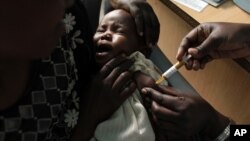Many doctors recommend that pregnant women who suffer from anemia be given supplements to raise the level of iron, an essential nutrient, in their blood.
But that rarely occurs in developing countries, experts say, given all of the other health challenges they face, including higher rates of malaria.
There is some evidence that iron supplementation increases the risk of malaria in children. It’s thought the immediate production of new red blood cells after treatment begins makes kids more attractive targets for disease-carrying mosquitoes.
But a new study in Kenya found virtually no difference in malaria risk among pregnant women who took iron supplements and those who didn't.
Hans Verhoef, a clinical epidemiologist at the London School of Hygiene and Tropical Medicine, led the study of 470 pregnant women, 60 percent of whom were anemic at the beginning.
He said the extra iron given to half of those women increased the duration of their pregnancies and the weight of their newborns.
“In those women, we do find an increase in birth weight by 250 grams, which is absolutely massive," Verhoef said. The study indicates that iron supplementation "certainly should go full steam ahead and that we should really try to increase coverage of that."
Low birth weight increases the risk of infant death and disabilities.
While iron supplements appeared to improve pregnancy outcomes, it had no impact on malaria infection. Fifty percent of the women given iron contracted the disease, compared with just over half of the women who received a placebo.
The findings were published in the Journal of the American Medical Association, along with a commentary by Robert Black of the Johns Hopkins University School of Public Health in Baltimore, Maryland. While he welcomed the news that iron supplements did not raise the risk of malaria, he warned against relying on them to protect against the disease.
“Where that prevention or treatment of malaria is not present or not very strong, we don’t know if there could be some risk [to iron supplementation]," he said. "So I think that’s the only caveat. But I think when the iron is given in the malaria setting, it’s very important to deal with the malaria as well as provide the iron.”
The authors noted that their results might apply to pregnant women in other low- and middle-income countries, although the effect on birth weight can vary depending on the prevalence of iron deficiency.









